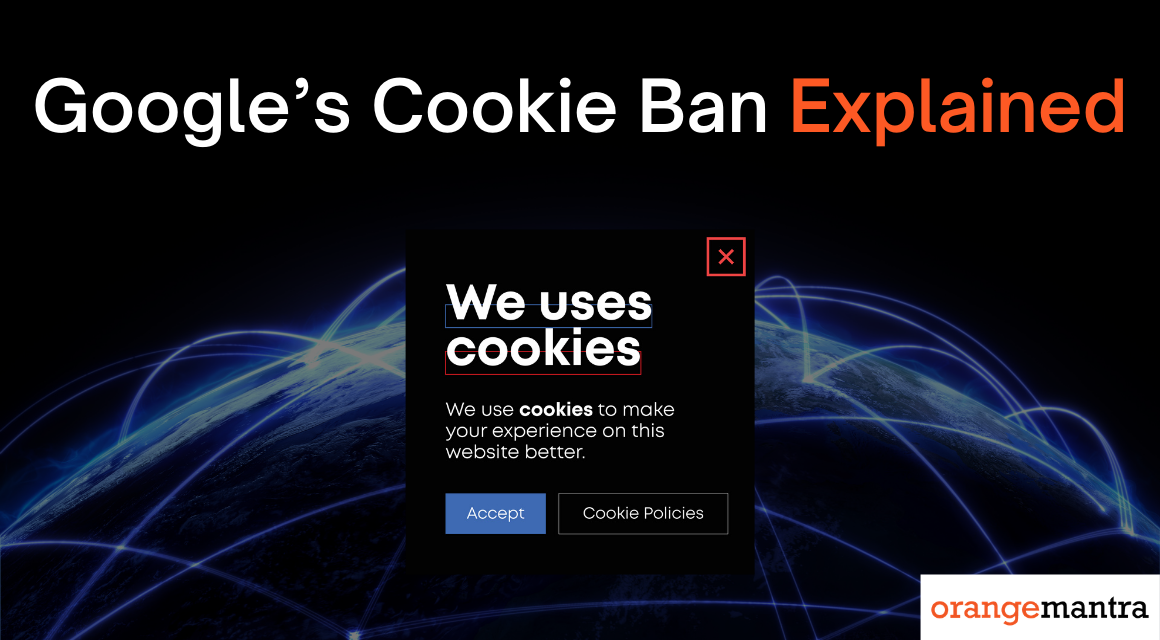Google will no longer use third-party cookies, the tech behemoth recently announced. This move will have a significant impact on the digital ad business. Plus, it’s a dramatic shift toward privacy — although in a limited manner. Google will, however, continue to track users within its own platforms and use that data for targeted advertising.
Google’s cookie ban will make it harder for sites to show ads based on users’ individual browsing history outside Google platforms. Tech companies like Facebook and Google use cookies to track people’s interactions with different sites. They build profiles for showing users targeted ads — a central element of the internet advertising business.
Google’s Privacy-First Web
The post-cookie web advertising
Google’s plan to eliminate third-party tracking cookies has been in the works for a while now. The tech titan is currently implementing this ban on its Chrome browser. To remove cookies, Google would deprecate those bits of code that track and store browsing history for targeted advertising. In January 2020, the company said that such cookies would be gone by 2022.
Last week, Google committed not to use or build any system that tracks individual users across the web. That means the tech giant won’t support some novel efforts by ad-tech companies to replace cookies with other tracking technologies. Such techniques include matching email addresses across databases.
“If digital advertising doesn’t evolve to address the growing concerns people have about their privacy and how their personal identity is being used, we risk the future of the free and open web,” Google’s David Temkin wrote in a blog post.
Replacing cookies with cohorts
Ad companies use third-party cookies to track you around the internet. Google’s third-party cookies are on millions of websites. They feed the internet goliath with a ton of data about the sites you visit. These pieces of information drive the central machinery of digital ads. However, the third-party cookie ban doesn’t apply to data collected through Google’s trackers and mobile apps.
But as the debate over privacy grows worldwide, regulators have been clamping down on companies over user data. Privacy laws like the European Union’s GDPR made it difficult for companies to track users. Governments around the world have pressed hard to make companies take privacy more seriously. That’s where Google’s Federated Learning of Cohorts (FLoC) comes into play. Google says it’s a “privacy-first” and “interest-based” advertising technology.
Interest-based advertising
FLoC proposes a new way for businesses to reach the target audience with relevant content and ads by clustering large groups of people with similar interests,” Google’s Chetna Bindra explained in a blog post. This approach uses on-device processing to keep the user’s web history private on the browser.
In other words, advertisers will target their ads to cohorts rather than individual web users. So, if you’re looking for a web browser that doesn’t collect your data for ads, you might like to use a different browser. That means Google will still deliver targeted ads but in a more anonymous and less intrusive way. Google says advertisers can get nearly the same ROI from FLoC as they did with cookies.
First-party cookies to stay
Google will still collect your first-party data. That means it will track you whenever you use a Google product like Search and YouTube. And Google will target ads based on it. First-party data, in fact, will now be more crucial as third-party data becomes off-limits. It is good for Google.
The biggest slice of the company’s revenue pie comes from ads on Google Search, according to its latest quarterly earnings report. It’s also significantly greater than the amount it earns from the ad network that relies on third-party cookies. Since the cookie ban would not affect Google Search, the targeted ad revenue stream will continue to flow.
Paving the future of digital privacy
Google has been discussing this new approach to targeted ads and privacy with top publishers and advertisers, such as The New York Times, BBC, and Facebook. Getting them on board makes the implementation of a new set of rules easier for Google. With these new standards, Google will push forward privacy on the web while continuing to sell targeted ads. The tech giant intends to improve our digital privacy by reining in the unregulated trackers and data hunters. It makes the web look safer without demonizing digital advertising as a business.
How OrangeMantra’s Web Solutions Help
Being a trends-driven tech solutions company, we keep a close watch on happenings like this. OrangeMantra’s web development services are designed to evolve with shifting trends and standards. Having been around in the industry for over two decades, we know how best to use technology to your advantage. Be it mobile apps or automation solutions, you could always trust our expertise. Follow our blogs and social posts to stay updated about all things tech.






















